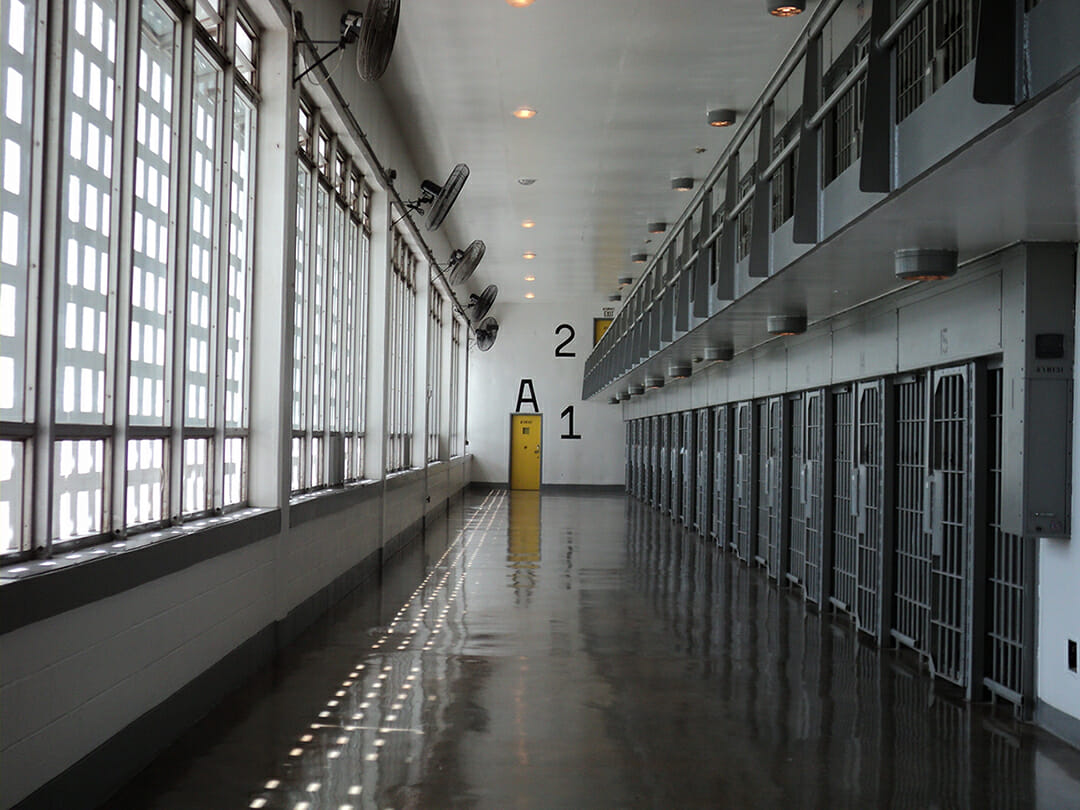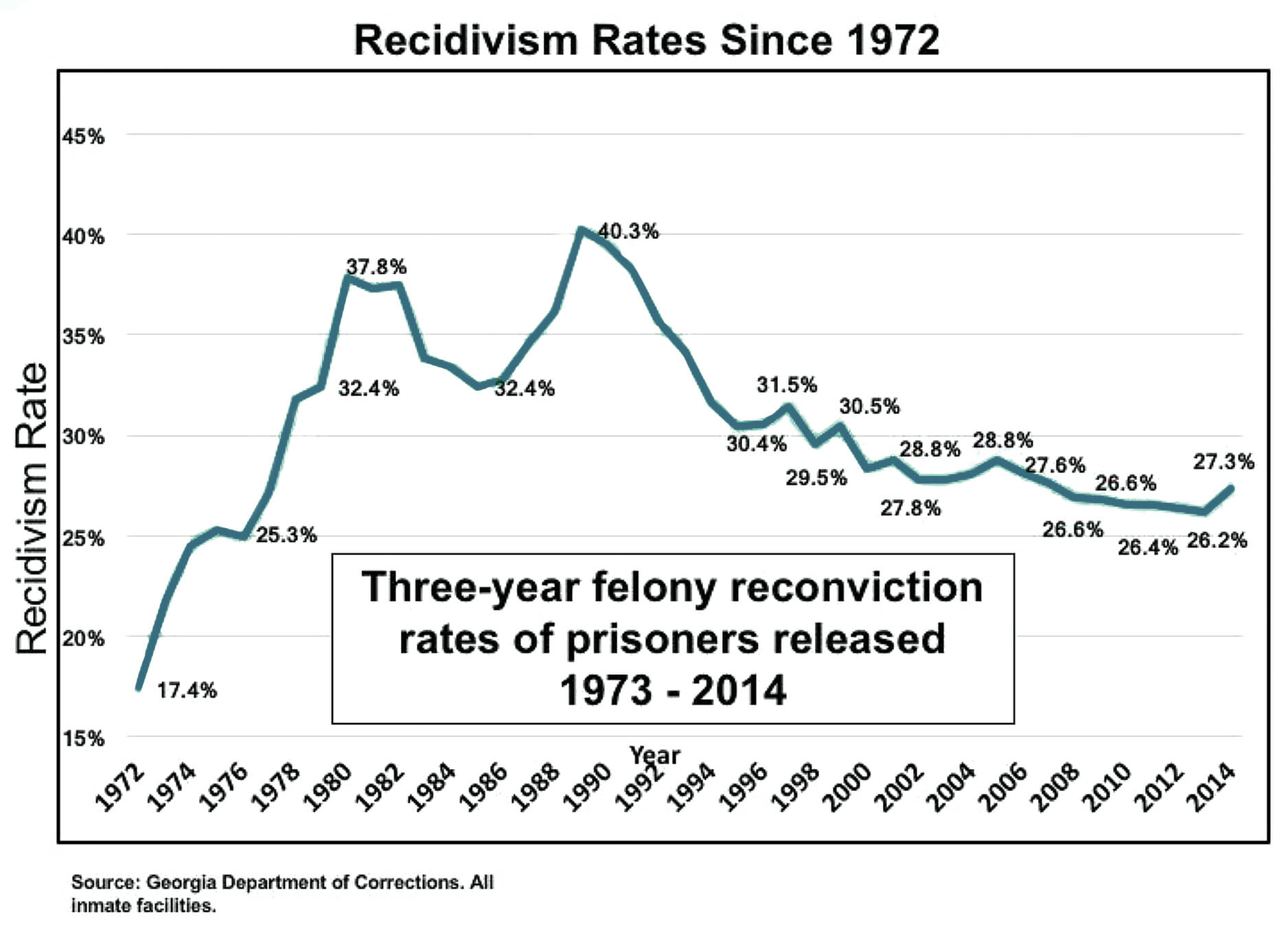
Criminal Justice in Georgia
Georgia’s criminal justice system spans a state territory that is some 59,000 square miles in size, creating a large network of jails, prisons, courthouses, drug courts, law enforcement departments, and federal prisons. The following paragraphs briefly outline Georgia crime, prison, and criminal justice statistics.
Georgia Prison Population Data
The place to begin when analyzing Georgia’s criminal justice system is to answer two questions:
- How many people are incarcerated in Georgia?
- What are the biggest prisons in Georgia?
According to the Bureau of Justice Statistics, Georgia ranks eighth in the nation for having the highest percentage of its population behind bars. Georgia is just behind Kentucky but just ahead of Idaho. As of December 2019, Georgia holds 54,113 inmates in state prisons and 45,340 individuals in jails. Georgia manages 34 state prisons and 183 county jails. While many of Georgia’s inmates are serving short-term sentences or awaiting trial in local jails, the jail population has begun to decline, while the prison population remains high. That means a higher percentage of Georgia offenders are being convicted and sent to prison rather than serving short sentences in jail or being let off on probation.1
Based on information from the National Institute of Corrections, Georgia also has 411,768 individuals under probation and 19,256 under parole.2 The state’s prison network employs a staff of 9,169 individuals with a budget of $1,205,012,739. According to the Urban Policy Project, Georgia’s Department of Corrections is the 7th costliest item in the state’s annual budget.3
Beyond the 34 state prisons and 183 local jails, Georgia has contracts with two private prison corporations, Corrections Corporation of America and the GEO Corporation. These two companies operate four private facilities in Georgia that house some 7,974 offenders.4

The Georgia Diagnostic and Classification Prison in Jackson is the state’s largest prison facility, both in terms of the size of the facility and its resident population. The facility houses about 2,100 male inmates at any given time on its 900-acre camp 50 miles south of Atlanta.5
Georgia Crime Rates and Recidivism Statistics

Crime rates fluctuate in Georgia, and not every government agency reports the same figures. The National Institute of Corrections data brief cited in the previous section reports that Georgia has a violent crime rate of 341 for every 100,000 population and an incarceration rate of 507 per 100,000, meaning close to half of those locked up in Georgia are serving prison sentences for non-violent crimes. Georgia also records 2,376 property crimes for every 100,000 people and 5,042 probationers for every 100,000.
The Bureau of Justice Assistance documents crime rates and recidivism, reporting that Georgia records about 35,000 violent crimes annually. Of those, about 500 are murders, 4,000 are rapes, 12,000 are robberies, and 20,000 are aggravated assaults. Georgia law enforcement performs about 323,435 arrests per year. According to BJA data, Georgia has a recidivism rate of 26%.6
Recidivism rates in Georgia are also well documented by Georgia’s state agencies. According to the Georgia Council on Criminal Justice Reform, the overall recidivism rate is at least 30%, meaning almost one in three Georgians who are released from prison will commit another crime and then re-enter prison. In their most recent report, the authors admit Georgia has been unable to improve its recidivism rate. Quoting their text, “Georgia’s annual spending on adult corrections had doubled, from $492 million to more than $1 billion. Despite this substantial investment, the state’s 30 percent recidivism rate had remained virtually unchanged for 10 years. Meanwhile, projections called for another wave of prison growth over the next half-decade, along with $264 million more in taxpayer costs.” To reduce the prison population, ease the burden on taxpayers, and lower recidivism, Georgia will have to implement a new criminal reform methodology and alternatives to incarceration.7

The challenges are serious. According to that report, recidivism rates are much higher among certain demographics. For example, among juvenile offenders, recidivism rates are at 65%, meaning two out of three juvenile offenders will end up back in prison following their release. Recidivism rates are also especially high for those held for long periods in pre-trial jail confinement.
Criminal Rehabilitation and Criminal Justice Reform in Georgia
The report mentioned in the previous section outlined a few key Georgia criminal reform approaches that must be implemented or expanded upon to reduce recidivism. For example, the report highlighted effective mental health and behavioral health treatments as sorely lacking in Georgia’s jails and prisons. That report also encouraged those who face mental and behavioral health challenges and who haven’t committed violent crimes to be diverted to primary care facilities, not prison cells. The report also encouraged reform of the state’s cash bail system to ensure that offenders are not spending undue time in jail awaiting trial simply because they cannot make bail.

Another area where policymakers could expand Georgia’s criminal reform is in its drug courts. According to the Criminal Justice Coordinating Council for Georgia, the state has 53 drug courts and 21 DUI courts. The state’s 18 family treatment courts, a newer program, are a pilot effort to assist defendants charged with substance abuse, domestic violence, and crimes whose offenses affect young children. Georgia state-level decision makers should expand these programs to provide offenders with a treatment-focused approach to rehabilitating criminal behavior.8
Beyond the expansion of the programs listed above, Georgia should also invest more heavily in:
- Drug Diversion Programs
- Residential Drug and Alcohol Rehab Programs
- Supervised Probation Over Jail Time
- House Arrest or Electronic Monitoring
- Compassionate Release for Elderly Inmates
- Work-Release Programs for Nonviolent Offenders
Georgia Alternatives to Incarceration
Alternatives to prison in Georgia, like those listed above, could be expanded. Further, Georgia’s criminal justice system would improve with more educational programs inside prisons. When inmates are educated and given real tools, life skills, and healthy coping strategies, they can face life outside prison without reoffending.
Rehabilitation programs inside Georgia prisons would certainly be more effective if they took on an educational aspect. There is a way out of the vicious cycle of criminality that has seemed unsolvable in Georgia. The key going forward will be adopting the correct tools and moving away from outdated methods that have only led to more incarceration and more expense to Georgia taxpayers.
Sources:
- BJA. “Prisoners in 2020 – Statistical Tables.” Bureau of Justice Statistics, 2021. bjs.ojp.gov
- NIC. “Georgia 2019.” National Institute of Corrections, 2020. nicic.gov
- Urban. “Project Georgia.” Urban Institute, 2022. urban.org
- GDC. “Private Prison Monitors.” Georgia Department of Corrections, 2022. gdc.ga.gov
- GDC. “State Prisons.” Georgia Department of Corrections, 2022. gdc.ga.gov
- BJA. “State Criminal Justice Profile, Georgia.” Bureau of Justice Assistance, 2014. bjafactsheets.iir.com
- DCS. “Report of the Georgia Council on Criminal Justice Reform.” Department of Community Supervision, 2018. dcs.georgia.gov
- CJCC. “Accountability Court Program.” Criminal Justice Coordinating Council, 2022. cjcc.georgia.gov
Related Articles
What Is the Scope of Private Prisons in the U.S.?
In 2001, the Federal Bureau of Justice Assistance authored a report analyzing then-emergent issues regarding private prisons in the United States. According to the authors...
Read more >>
Successes from Correctional Centers in Nashville, Tennessee
The Art of Happiness “I learned the art of happiness. “Before this class I knew what made me happy but I was unaware that happiness...
Read more >>



